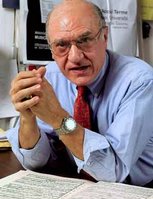 Composer/keyboardist/producer Elodie Lauten creates operas, music for dance and theatre, orchestral, chamber and instrumental music. Not a household name, she is however widely recognized by historians as a leading figure of post-minimalism and a force on the new music scene, with 20 releases on a number of labels.
Composer/keyboardist/producer Elodie Lauten creates operas, music for dance and theatre, orchestral, chamber and instrumental music. Not a household name, she is however widely recognized by historians as a leading figure of post-minimalism and a force on the new music scene, with 20 releases on a number of labels.
Her opera Waking in New York, Portrait of Allen Ginsberg was presented by the New York City Opera (2004 VOX and Friends) in May 2004, after being released on 4Tay, following three well-received productions. OrfReo, a new opera for Baroque ensemble was premiered at Merkin Hall by the Queen's Chamber Band, whose New Music Alive CD (released on Capstone in 2004) includes Lauten's The Architect. The Orfreo CD was released in December 2004 on Studio 21. In September 2004 Lauten was composer-in-residence at Hope College, MI. Lauten's Symphony 2001, was premiered in February 2003 by the SEM Orchestra in New York. In 1999, Lauten's Deus ex Machina Cycle for voices and Baroque ensemble (4Tay) received strong critical acclaim in the US and Europe. Lauten's Variations On The Orange Cycle (Lovely Music, 1998) was included in Chamber Music America's list of 100 best works of the 20th century.
Born in Paris, France, she was classically trained as a pianist since age 7. She received a Master's in composition from New York University where she studied Western composition with Dinu Ghezzo and Indian classical music with Ahkmal Parwez. Daughter of jazz pianist/drummer Errol Parker, she is also a fluent improviser. She became an American citizen in 1984 and has lived in New York since the early seventies
|
|
|
|
|

Thursday, May 17, 2007
Who's Who: Dinu Ghezzo

I couldn't go to many concerts this season because of a very tight schedule, but I managed to catch one not-to-miss event: on April 28, the Department of Music and Performing Arts Professions at New York University presented a celebration concert of Dinu Ghezzo’s retirement after 30 years at NYU – where, thank goodness for that – he will remain in a professor emeritus capacity and continue to be involved in a number of projects in both conducting and composition. This concert was a tribute to his major contribution to the composition program at NYU. Above and beyond teaching, he acted as a cultural ambassador for NYU in creating many international programs in Europe and Asia. I am glad I had the chance to study with him some twenty years ago. I still remember his exciting presentations, his positive energy and relentless enthusiasm for music.
But what I would like to emphasize here is that Dinu Ghezzo is, beyond his duties as an educator, an important composer, whose music is published both in Europe and in the U.S. and has been presented in major venues throughout the world, from Los Angeles to Tokyo to Helsinki, and has been critically acclaimed as “startlingly beautiful”, “haunting”, “exuberant”, “striking”, which does not begin to describe the unique style of his work. From a postmodern perspective, Dinu Ghezzo’s music encompasses and transcends the musics of his time, from Eastern European folk song to post-serialism, aleatory composition, experimental techniques such as prepared piano which he uses to perfection, to post-minimalism and onward. But ultimately, it has soul, and that’s why it touches me. Last fall I heard a clarinet and piano piece by him, Aphorisms (brilliantly performed by Esther Lamneck and Marilyn Nonken) and months later, I find I still try to recall its mood.
Talking about feelings – even though Dinu’s concert was planned for months in advance, upon the passing of his good friend and member of the NYU faculty, Ron Mazurek (which took place a couple of days before the event), he was compelled at the very last minute to change the entire program to include some of Mazurek’s compositions: Rockaby, for voice and piano, and Satori, for clarinet and tape. I found this very touching and most generous. At various points in the concert, we were surprised by the appearance of a Romanian folk singer in traditional costume, performing Dinu’s just-finished Easter Laments in memory of his old friend; that was truly heartbreaking.
Dinu Ghezzo’s other pieces on this concert included: Shadow Dances, an exciting orchestral piece which he conducted; Doina, a semi-improvisational piece from 1998 featuring Christine Ghezzo, a lovely modern-voice soprano; Music for Flutes and Tape (Wendy Luck performer); Imaginary Voyages, for clarinet, piano and cello (Esther Lamneck, Dan Barrett and Marilyn Nonken performers).
Other features on the program included Joseph Pehrson’s electronic work Microproj, with a sparkling and unexpected choreography by his wife, Linda Past; and a new work by John Gilbert, Becoming Cassandra, including state-of-the-art media.
posted by Elodie Lauten
5:09 PM
| |



